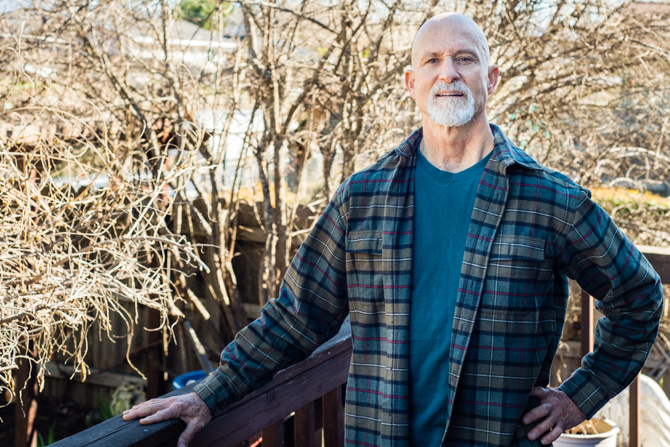LAKEPORT, Calif.—When we last left Brad Stevens, he was living in Lakeport, Calif., a struggling massage therapist in a struggling town on the southern tip of Clear Lake. Brad has been uninsured his entire adult life and believed firmly that clean living and exercise could stave off any need for medical care. After a bike accident which injured his shoulder and a battle with advanced thyroid cancer, Brad was anxious to enroll in some form of insurance – any kind of insurance – under the Affordable Care Act.
“I talked to an insurance guy who is selling Obamcare and found out I don’t qualify,” Brad said last November. “What I’m going to get is Medi-Cal,” California’s Medicaid program.
The insurance broker had warned Brad about long wait times, but when he called the toll-free line for Covered California, the state’s insurance marketplace, Brad said, “I waited four minutes. It was a piece of cake.” The operator didn’t offer to help him apply for Medi-Cal,but instead told Brad to call the social services office in Lake County. “It wasn’t a one-stop shop.”
When Brad finally called the county social services office on January 6, he was worried his two aging cars and the modest home he had bought long ago from his mother would count against him— a common concern. Sure enough, the forms that arrived in the mail asked for details about Brad’s bank account and any cars he owned. “So I called them back up and said, ‘You don’t need half of this stuff that you’re requesting.’ They said, ‘Yes, you’re right. That’s an old form. We haven’t switched over.'”
On January 23, Brad collected his records and made the half hour drive down to the county office. “They were really efficient at the office,” Brad said, sounding surprised. Of the county worker, “She was like, Boom! Boom! Boom! She’s been doing this ten years. I was just signing stuff.” The county worker told him to expect the Medi-Cal enrollment to take 45 days.
When we next talked on February 7, he was anxious to get his insurance card. He needed to refill his thyroid medication—Brad has no thyroid and relies on medication to keep his body functioning. His pharmacist told him that the company that makes his pills had raised the price from $12.99 to $68. “I’m down to 24 pills right now, so I’m counting them daily. If I haven’t gotten my [Medi-Cal] number before I’m out of pills, I’m going to call Walmart to find out what their price is.”
There were other concerns if his Medi-Cal didn’t kick in soon: To monitor his condition, Brad has to get his blood drawn every year. In the years following his thyroid cancer, he could get the blood work done for $50 to $60—he always had to pay cash—but now that same service was costing him $200. “It’s gone astronomical.”
With only a few thyroid pills left—and no Medi-Cal confirmation—Brad went to Walmart and was able to get his prescription filled for $10 in cash. It’s a different brand than he’s used to, and he says it makes him more irritable and restless at night. “The medication I get at Walmart isn’t as good as the medication I get here at the pharmacy in Lakeport.” The brand stocked at his local pharmacy, while now much more expensive, “keeps me really level. Where I find the stuff from the pharmacy at Walmart, I do more fluctuations, moods and more night sweat nights. More heart palpitations.”
At the beginning of March, a Lake County case worker called Brad to tell him his Medi-Cal was active. “Basically it took two months from start to finish,” Brad said. “Now that I’m covered, I want a physical, and a regular check up that normal people having insurance get, and I want to get a colonscopy,” Brad said, laughing at his own enthusiasm for the invasive and unpleasant procedure.
It’s been a few years since Brad has seen a specialist about his thyroid. The last specialist, at the University of California, San Francisco, charged him $2,500 for an hour-long visit. “It was super expensive,” Brad said. “And I ran out of money.” Now that he’s enrolled in Medi-Cal, Brad is planning to call his primary care doctor soon to make an appointment and search for a specialist in his rural region.
Even though the card still hasn’t arrived, he says being accepted into Medi-Cal is an extraordinary relief: “It’s an incredible piece of mind. I’m going, Yee-haw!”








